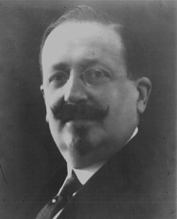|
Antonio Mosconi
Antonio Mosconi (9 September 1866 – 12 July 1955) was an Italian businessman and politician who held various political and government posts, including the finance minister between July 1928 and July 1932. BiographyHailed from a family based in Vicenza Mosconi was born on 9 September 1886.[1][2] He received a law degree from the University of Padua in 1908.[2] In 1911, he was named the secretary of the ministry of the interior.[2] He was appointed municipal commissioner in Trieste in July 1919.[3] When the military authority in Trieste was converted into a civil authority which was named as the provincial civilian government in July 1919, Mosconi headed it after Augusto Ciuffelli.[4] Mosconi's term in this post began in December 1919.[3] From 1920, Mosconi was a member of the Italian Senate and the councillor of state.[5] He was appointed minister of finance to the Mussolini's cabinet in July 1928 replacing Giuseppe Volpi in the post.[1][5] In July 1932, Mosconi resigned from the office, and Guido Jung replaced him as finance minister.[6] In the period 1932–1934, he headed the National Bank of Agriculture.[2] The other posts of Mosconi included the head of the Central Tax Commission (1939–1944) and of the Olympic Academy of Vicenza (1936–1944).[2] He died on 12 July 1955.[2] References
External links
|
||||||||||||||||||||||||||||
Portal di Ensiklopedia Dunia

